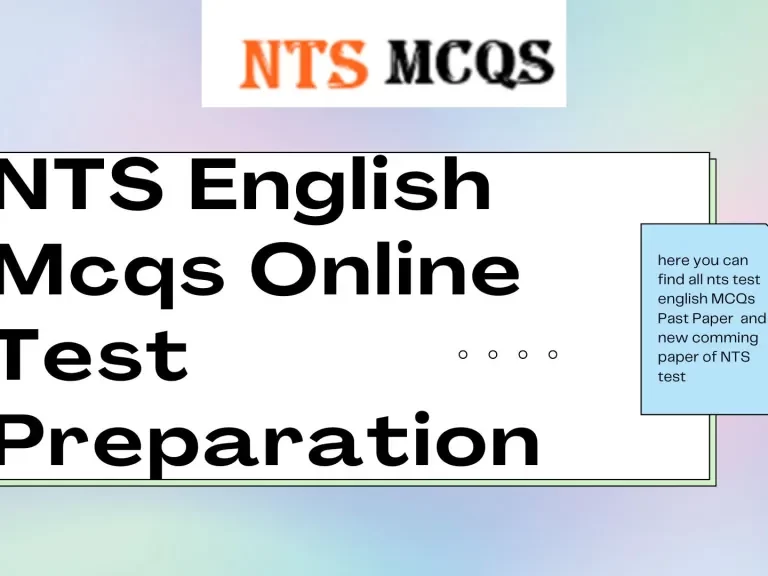
Introduction to English MCQs:
English MCQs (Multiple Choice Questions) are a way to test knowledge and understanding of various aspects of the English language.
These questions cover grammar, vocabulary, comprehension, and literature.
They are commonly used in educational settings to assess students’ proficiency in English.
Types of English MCQs:
Grammar MCQs: English mcqs English mcqs English mcqs English mcqs English mcqs
Test knowledge of grammar rules, such as subject-verb agreement, tense usage, and sentence structure.
Vocabulary MCQs:
Assess word meanings, synonyms, antonyms, and context clues.
Example: “What is the synonym of ‘happy’?”
Reading Comprehension MCQs:
Evaluate understanding of passages or texts by asking questions about main ideas, details, inference, and vocabulary in context.
Literature MCQs:
Focus on literary elements such as characters, plot, themes, and literary devices in works of literature.
Purpose of English MCQs:
Assess understanding of English language concepts.
Prepare students for standardized tests and examinations.
Provide feedback for improvement in language proficiency.

Advantages of English MCQs:
Objective assessment: MCQs provide clear right or wrong answers, reducing subjective interpretation.
Time-efficient: Can assess a large number of students quickly.
Easy to score: Automated scoring systems can grade MCQs rapidly.
Comprehensive coverage: MCQs can cover a wide range of topics and skills in English language learning.
Tips for Answering English MCQs:
Eliminate obviously incorrect options.
Pay attention to grammar, vocabulary, and context clues in reading comprehension questions.
Use process of elimination if unsure about an answer.
Review and double-check answers before submitting.
English Blogs:
Introduction to English Blogs:
English blogs are online platforms where individuals or groups share thoughts, ideas, experiences, and expertise related to the English language.
These blogs cover a wide range of topics, including language learning tips, grammar explanations, vocabulary expansion, literature reviews, and writing advice.
They serve as valuable resources for language learners, educators, and enthusiasts seeking information and support in English language acquisition and proficiency.
Types of English Blogs:
Language Learning Blogs:
Offer practical tips and strategies for improving English language skills, including speaking, listening, reading, and writing.
Provide advice on effective language learning techniques and resources.
Grammar and Vocabulary Blogs:
Explain grammar rules and usage in a clear and concise manner, often with examples and exercises for practice.
Introduce new words, idioms, phrasal verbs, and expressions, along with definitions and usage examples.
Literature and Writing Blogs:
Review and analyze literary works, discussing themes, characters, plot, and writing style.
Offer writing advice and guidance for improving writing skills, including brainstorming, drafting, revising, and editing.
Language and Culture Blogs:
Explore the relationship between language and culture, discussing linguistic phenomena, cultural practices, and cross-cultural communication.
Examine how language reflects and influences cultural identity, values, beliefs, and traditions.
Interactive Community Blogs:
Foster a sense of community among language learners and enthusiasts by encouraging interaction through comments, discussions, and sharing of experiences.
Provide opportunities for guest posts, interviews, collaborations, and networking within the language learning community.
Unique Data about English Blogs:
Specialized Focus:
Some English blogs focus on specific aspects of language learning, such as pronunciation, grammar, or business English.
Others cater to niche audiences, such as English for academic purposes (EAP) or English for specific purposes (ESP).
Multimedia Content:
Many English blogs incorporate multimedia elements such as videos, podcasts, infographics, and interactive quizzes to enhance learning and engagement.
These multimedia resources cater to different learning styles and preferences, making language learning more dynamic and interactive.
Expert Contributors:
Some English blogs feature contributions from language experts, educators, linguists, authors, and other professionals in the field.
These expert insights provide valuable perspectives and expertise on various language-related topics, enriching the content of the blog.
User-generated Content:
Several English blogs encourage user-generated content, allowing readers to contribute their own articles, essays, stories, or language learning experiences.
This collaborative approach fosters a sense of ownership and participation among the blog’s audience, creating a vibrant and inclusive community.
Global Reach:
English blogs have a global audience, reaching learners and enthusiasts from diverse linguistic and cultural backgrounds around the world.
They facilitate cross-cultural exchange and communication, connecting individuals with a shared interest in the English language regardless of geographical location.
Benefits of English Blogs:
Accessible Resources:
English blogs provide free and accessible resources for language learning and enrichment, available anytime and anywhere with an internet connection.
They complement traditional language learning materials and classroom instruction, offering additional support and reinforcement outside the classroom.
Flexible Learning:
Learners can explore English blogs at their own pace and according to their individual interests and learning goals.
They can choose from a wide range of topics and resources tailored to their specific needs and preferences.
Interactive Engagement:
English blogs promote active engagement and participation through interactive features such as comments, discussions, quizzes, and collaborative projects.
Learners can interact with content creators, ask questions, share insights, and connect with fellow language learners in a supportive online community.
Continuous Improvement:
By regularly reading and engaging with English blogs, learners can continuously improve their language skills, expand their vocabulary, and deepen their understanding of English language and culture.

Tips for Using English Blogs:
Explore a variety of English blogs to discover different perspectives, approaches, and resources for language learning and enrichment.
Follow blogs that resonate with your interests, learning style, and proficiency level in English.
Stay engaged with English blogs by reading regularly, participating in discussions, leaving comments, and sharing your own experiences and insights.
Take advantage of interactive features such as quizzes, polls, and challenges to test your knowledge and skills.
Be Selective:
Be selective in choosing English blogs that provide accurate, reliable, and high-quality content.
Look for blogs authored or endorsed by reputable language experts, educators, institutions, or organizations.
Practice Consistently:
Use English blogs as a supplementary resource to practice and reinforce language skills on a regular basis.
Set aside dedicated time each day or week to read, listen, watch, and engage with blog content.
Seek Feedback:
Seek feedback from peers, teachers, or language partners on your language learning progress and performance based on insights gained from English blogs.
Share your thoughts, questions, and challenges with the online community to receive support and guidance.
In conclusion, English MCQs and blogs are valuable resources for language learners and enthusiasts seeking to improve their proficiency in English language skills.
MCQs provide objective assessment and feedback on grammar, vocabulary, comprehension, and literature,
while blogs offer accessible, interactive, and diverse content on language learning tips, grammar explanations, vocabulary expansion, literature reviews, writing advice, and language and culture exploration.
By leveraging these resources effectively, learners can enhance their language skills, deepen their understanding of English language and culture, and connect with a global community of language learners and enthusiasts.
AOA
Ma sha Allah good.
Ma Sha Allah
Well done
Thanks
El coste de la incapacidad temporal por cefaleas en EspaГ±a buy priligy australia
In the human prostate, expression of ER ОІ was reported to be consistently expressed in normal prostate, but in many studies expression was decreased or absent in prostatic cancer, paralleling tumor grade priligy prescription This was alarming at first as I m very fit and have normal testosterone levels for a female